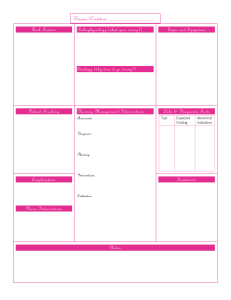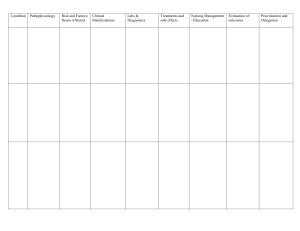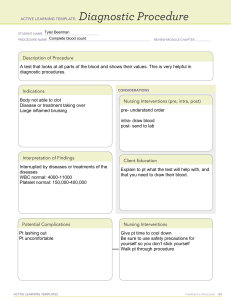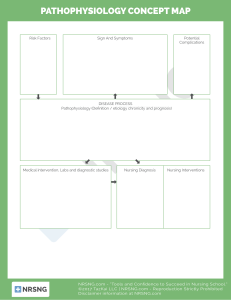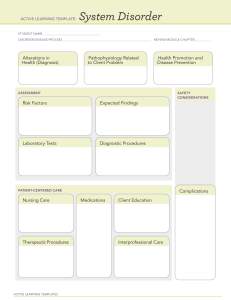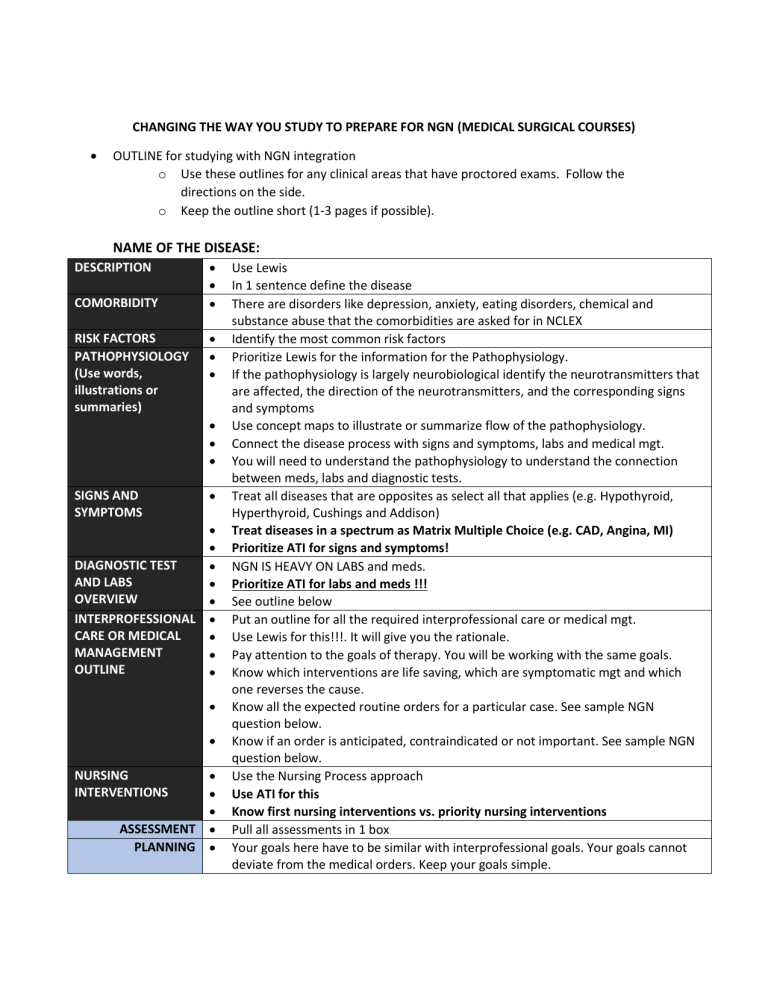
CHANGING THE WAY YOU STUDY TO PREPARE FOR NGN (MEDICAL SURGICAL COURSES) OUTLINE for studying with NGN integration o Use these outlines for any clinical areas that have proctored exams. Follow the directions on the side. o Keep the outline short (1-3 pages if possible). NAME OF THE DISEASE: DESCRIPTION COMORBIDITY RISK FACTORS PATHOPHYSIOLOGY (Use words, illustrations or summaries) SIGNS AND SYMPTOMS DIAGNOSTIC TEST AND LABS OVERVIEW INTERPROFESSIONAL CARE OR MEDICAL MANAGEMENT OUTLINE ASSESSMENT PLANNING NURSING INTERVENTIONS Use Lewis In 1 sentence define the disease There are disorders like depression, anxiety, eating disorders, chemical and substance abuse that the comorbidities are asked for in NCLEX Identify the most common risk factors Prioritize Lewis for the information for the Pathophysiology. If the pathophysiology is largely neurobiological identify the neurotransmitters that are affected, the direction of the neurotransmitters, and the corresponding signs and symptoms Use concept maps to illustrate or summarize flow of the pathophysiology. Connect the disease process with signs and symptoms, labs and medical mgt. You will need to understand the pathophysiology to understand the connection between meds, labs and diagnostic tests. Treat all diseases that are opposites as select all that applies (e.g. Hypothyroid, Hyperthyroid, Cushings and Addison) Treat diseases in a spectrum as Matrix Multiple Choice (e.g. CAD, Angina, MI) Prioritize ATI for signs and symptoms! NGN IS HEAVY ON LABS and meds. Prioritize ATI for labs and meds !!! See outline below Put an outline for all the required interprofessional care or medical mgt. Use Lewis for this!!!. It will give you the rationale. Pay attention to the goals of therapy. You will be working with the same goals. Know which interventions are life saving, which are symptomatic mgt and which one reverses the cause. Know all the expected routine orders for a particular case. See sample NGN question below. Know if an order is anticipated, contraindicated or not important. See sample NGN question below. Use the Nursing Process approach Use ATI for this Know first nursing interventions vs. priority nursing interventions Pull all assessments in 1 box Your goals here have to be similar with interprofessional goals. Your goals cannot deviate from the medical orders. Keep your goals simple. INTERVENTION ENVIRONMENTAL CONTROL EXPECTED MEDICATIONS AND SHORT DESCRIPTION OF PURPOSE Write down all interventions Assume select all that apply or Matrix Multiple Choice as how this portion will be asked. Use ATI for this. Example Choices: Stimulating vs. none stimulating environment, single occupancy vs. double occupancy, type of precautions (airborne, standard etc) E.g. FOR MI Morphine to reduce myocardial workload Nitroglycerine to reduce peripheral vascular resistance Aspirin as an antiplatelet aggregator FOR FRACTURES Morphine to reduce pain FOR PULMONARY EDEMA Morphine to reduce shortness of breathe ASPIRIN IN RA To reduce inflammation and promote mobility or to reduce morning stiffness Use the indication of the medication as to how it is being used for the disorders, NOT the general purpose of the medications. Know how to measure clinical effectiveness of the medication WITH the disorder not the drug. RECOMMENDED ACTIVITIES OR SLEEP REST PROMOTION EVALUATION DIET COMPLICATIONS OVERVIEW (See table Below) E.g. increase activity as tolerated, cluster activities, bed rest, bed rest with commode privilieges Specify the diet Use ATI RN Nutrition Book for specific diets E.g. High K diet- raisins, cantaloupes, apricots, strawberries, bananas Describe when the patient is ready to be discharged. What signs are you looking for? DIAGNOSTIC TEST OUTLINE Type of Test And Description of purpose of the test When is this test ordered? (Admission, before medications, to check for complications or adverse effect) Expected Results (Show the direction) Is this test diagnostic, does it check for a complication, does it check for baseline information? What complication is it checking for? Highlight in red any test that is diagnostic or pathognomonic. COMPLICATIONS Addresses bowtie NGN questions. POSSIBLE COMPLICATION SIGNS AND SYMPTOMS OR PARAMETER TO REPORT ACTIONS TO TAKE (Give at least 5 using the 5 steps of the Nursing Process) MEDICAL MGT OUTLINE THERAPY AND DESCRIPTION PURPOSE EXPECTED RESULTS DRUG OUTLINE NAME OF THE DRUG: PURPOSE OR INDICATION SIDE EFFECT ADVERSE EFFECT MONITORING NURSING INTERVENTIONS NURSING CONSIDERATIONS IF ANY
